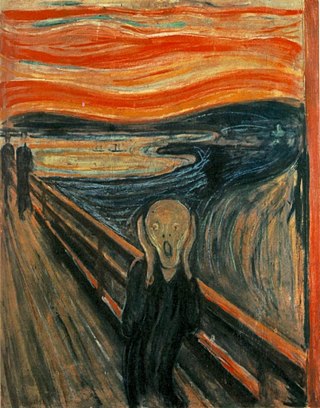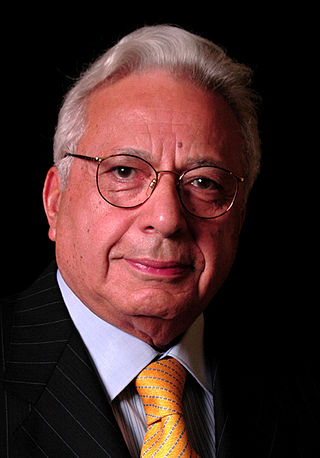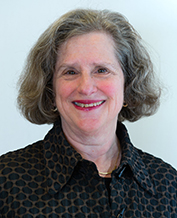
Anxiety disorders are a cluster of mental disorders characterized by significant and uncontrollable feelings of anxiety and fear such that a person's social, occupational, and personal function are significantly impaired. Anxiety may cause physical and cognitive symptoms, such as restlessness, irritability, easy fatiguability, difficulty concentrating, increased heart rate, chest pain, abdominal pain, and a variety of other symptoms that may vary based on the individual.

The National Institute of Neurological Disorders and Stroke (NINDS) is a part of the U.S. National Institutes of Health (NIH). It conducts and funds research on brain and nervous system disorders and has a budget of just over US$2.03 billion. The mission of NINDS is "to reduce the burden of neurological disease—a burden borne by every age group, every segment of society, and people all over the world". NINDS has established two major branches for research: an extramural branch that funds studies outside the NIH, and an intramural branch that funds research inside the NIH. Most of NINDS' budget goes to fund extramural research. NINDS' basic science research focuses on studies of the fundamental biology of the brain and nervous system, genetics, neurodegeneration, learning and memory, motor control, brain repair, and synapses. NINDS also funds clinical research related to diseases and disorders of the brain and nervous system, e.g. AIDS, Alzheimer's disease, epilepsy, muscular dystrophy, multiple sclerosis, Parkinson's disease, spinal cord injury, stroke, and traumatic brain injury.
The National Institute of Mental Health (NIMH) is one of 27 institutes and centers that make up the National Institutes of Health (NIH). The NIH, in turn, is an agency of the United States Department of Health and Human Services and is the primary agency of the United States government responsible for biomedical and health-related research.
Lisa Dixon is a Professor of Psychiatry at the Columbia University Irving Medical Center and the Director of the Division of Behavioral Health Services and Policy Research within the Department of Psychiatry. Her research focuses on improving the quality of care for individuals diagnosed with serious mental illnesses. She directs the Center for Practice Innovations (CPI) at the New York State Psychiatric Institute, where she oversees the implementation of evidence-based practices for individuals with serious mental illnesses for the New York State Office of Mental Health. She leads OnTrackNY, a statewide treatment program for adolescents and young adults experiencing their first episode of psychosis.
Bipolar disorder in children, or pediatric bipolar disorder (PBD), is a controversial mental disorder in children and adolescents that is mainly diagnosed in the United States, and is hypothesized to be like bipolar disorder (BD) in adults, thus is proposed as an explanation for extreme changes in mood and behavior accompanying periods of depressed or irritable moods and periods of elevated moods so called manic or hypomanic episodes. These shifts are sometimes quick, but usually are gradual. The average age of onset of pediatric bipolar disorder is unclear, but the risk increases with the onset of puberty. Bipolar disorder is rare in childhood. Pediatric bipolar disorder is typically more severe and has a poorer prognosis than bipolar disorder with onset in late-adolescence or adulthood.
Child and adolescent psychiatry is a branch of psychiatry that focuses on the diagnosis, treatment, and prevention of mental disorders in children, adolescents, and their families. It investigates the biopsychosocial factors that influence the development and course of psychiatric disorders and treatment responses to various interventions. Child and adolescent psychiatrists primarily use psychotherapy and/or medication to treat mental disorders in the pediatric population.
F. Xavier Castellanos, M.D. is the director of research at the NYU Child Study Center. His work aims at elucidating the neuroscience of ADHD through structural and functional brain imaging studies, collaborating on molecular genetic studies, and coordinating an interdisciplinary network of translational investigators. Dr. Castellanos chaired the NIH ‘Initial Review Group’ on Developmental Psychopathology and Developmental Disabilities from 2005–2007 and is chairing the revision of the diagnostic criteria for externalizing disorders for the forthcoming edition of DSM-V, projected for 2012. He continues to make significant contributions to research into the neurobiological substrates of attention deficit hyperactivity disorder.
The following outline is provided as an overview of and topical guide to abnormal psychology:
Steven Edward Hyman is Director of the Stanley Center for Psychiatric Research at the Broad Institute of MIT and Harvard in Cambridge, Massachusetts. He is also Harvard University Distinguished Service Professor of Stem Cell and Regenerative Biology. Hyman was Provost of Harvard University from 2001 to 2011 and before that Director of the U.S. National Institute of Mental Health (NIMH) from 1996 to 2001. Hyman received the 2016 Rhoda and Bernard Sarnat International Prize in Mental Health from the National Academy of Medicine for "leadership in furthering understanding and treatment of psychiatric disorders as biological diseases".

Obsessive–compulsive disorder (OCD) is a mental and behavioral disorder in which an individual has intrusive thoughts, or an obsession and feels the need to perform certain routines/compulsions repeatedly to relieve the distressed caused by the obsession, to the extent where it impairs general function. Obsessions are persistent unwanted thoughts, mental images, or urges that generate feelings of anxiety, disgust, or discomfort. Common obsessions include fear of contamination, obsession with symmetry, the fear of acting blasphemously, their own sexual orientation, and the fear of possibly harming others or themselves. Compulsions are repeated actions or routines that occur in response to obsessions to achieve a relief from anxiety. Common compulsions include excessive hand washing, cleaning, counting, ordering, avoiding triggers, hoarding, neutralizing, seeking assurance, praying, and checking things. People with OCD may only perform mental compulsions, this is called primarily obsessional obsessive–compulsive disorder. Many adults with OCD are aware that their compulsions do not make sense, but they perform them anyway to relieve the distress caused by obsessions. Compulsions occur often, typically taking up at least one hour per day and impairing one's quality of life.

Ahmed Okasha is an Egyptian psychiatrist. He is a professor of psychiatry at Ain Shams University Faculty of Medicine, Cairo, Egypt. He wrote books and articles about psychiatry and mental disorders. He is the first Arab-Muslim to be president of World Psychiatric Association from 2002 to 2005.

Thomas Roland Insel is an American neuroscientist, psychiatrist, entrepreneur, and author who led the National Institute of Mental Health (NIMH) from 2002 until November 2015. Prior to becoming Director of NIMH, he was the founding Director of the Center for Behavioral Neuroscience at Emory University in Atlanta, Georgia. He is best known for research on oxytocin and vasopressin, two peptide hormones implicated in complex social behaviors, such as parental care and attachment. He announced on Sept. 15, 2015, that he was resigning as the director of the NIMH to join the Life Science division of Google X. On May 8, 2017, CNBC reported that he had left Verily Life Sciences. Insel is a Co-founder with Richard Klausner and Paul Dagum of a digital mental health company named "Mindstrong," a Bay-area startup. He has also co-founded Humanest Care, NeuraWell Therapeutics, and MindSite News and is a member of the scientific advisory board for Compass Pathways, a company that is developing the psychedelic drug psilocybin to treat depression and other mental health disorders. His book, Healing: Our Path from Mental Illness to Mental Health was published by Penguin Random House in February, 2022.
Susan Swedo is a researcher in the field of pediatrics and neuropsychiatry. Beginning in 1998, she was Chief of the Pediatrics & Developmental Neuroscience Branch at the US National Institute of Mental Health. In 1994, Swedo was lead author on a paper describing pediatric autoimmune neuropsychiatric disorders associated with streptococcal infections (PANDAS), a controversial hypothesis proposing a link between Group A streptococcal infection in children and some rapid-onset cases of obsessive-compulsive disorder (OCD) or tic disorders such as Tourette syndrome. Swedo retired from the NIH in 2019, and serves on the PANDAS Physician Network.
James Frederick Leckman, M.D., is a child psychiatrist and psychoanalyst and the Neison Harris Professor of Child Psychiatry, Psychiatry, Psychology and Pediatrics at the Yale School of Medicine, recognized for his research in Tourette syndrome (TS) and obsessive–compulsive disorder (OCD).
William T. Carpenter, M.D. is a psychiatrist, a pioneer in the fields of psychiatry and pharmacology who served as an expert witness in the John W. Hinckley trial for the attempted assassination of U.S. President Ronald Reagan. His primary professional interest is in severe mental illness, especially schizophrenia, to the prevention and treatment of which he has made significant contributions in psychopathology, assessment methodology, testing of new treatments, and research ethics.
Euripedes Constantino Miguel Filho is a Brazilian psychiatrist. He is a graduate of the Faculdade de Medicina da Universidade de São Paulo. He currently holds the title of Full Professor and is the Vice-Head of the FMUSP Department of Psychiatry. He is also an Adjunct Associate Professor at Duke University and at Yale University, as well as being a Research Consultant for Harvard University School of Medicine Massachusetts General Hospital. Miguel has authored or co-authored more than 150 articles published in journals indexed for the major international databases. Since 2004, he has coordinated the Consórcio Brasileiro de Pesquisa dos Transtornos do Espectro Obsessivo-Compulsivo. He is a researcher for the Fundação de Amparo à Pesquisa do Estado de São Paulo and is the recipient of a 1B Research Productivity Grant from the Brazilian Conselho Nacional de Desenvolvimento Científico e Tecnológico. He is also the Director of the multicenter Instituto Nacional de Psiquiatria do Desenvolvimento para Infância e Adolescência, which was established under the auspices of the Institutos Nacionais de Ciência e Tecnologia. In the area of obsessive-compulsive disorder (OCD), he is coordinating his third FAPESP-sponsored Program Grant, which is focused on the investigation of neural circuits and biomarkers involved in OCD through the study of behavioral paradigms of fear and anxiety.

Wayne Goodman is an American psychiatrist and researcher who specializes in Obsessive-Compulsive Disorder (OCD). He is the principal developer, along with his colleagues, of the Yale-Brown Obsessive Compulsive Scale (Y-BOCS), which is considered to be the gold standard for assessing OCD.
Joseph Zohar is the director of Psychiatry and the Anxiety and Obsessive Compulsive Clinic at the Sheba Medical Center in Tel HaShomer and professor of psychiatry at Tel Aviv University, Israel. He is the founder of the World Council on Anxiety as well as the Israeli Consortium on PTSD. He currently leads the chief installation of the Israeli Defense Force for the treatment of PTSD. He is a member of the executive committee of the European College of Neuropsychopharmacology, of which he is a former president, and chairman of the Expert Platform on Mental Health.

Lori Altshuler was a professor at the University of California, Los Angeles (UCLA) Department of Psychiatry and Biobehavioral Sciences and held the Julia S. Gouw Endowed Chair for Mood Disorders. Altshuler was the Director of the UCLA Mood Disorders Research Program and the UCLA Women's Life Center, each being part of the Neuropsychiatric Hospital at UCLA.

Ellen Leibenluft is an American psychiatrist and physician-scientist researching the brain mechanisms mediating bipolar disorder and severe irritability in children and adolescents. She is a senior investigator and chief of the mood dysregulation and neuroscience section at the National Institute of Mental Health.








